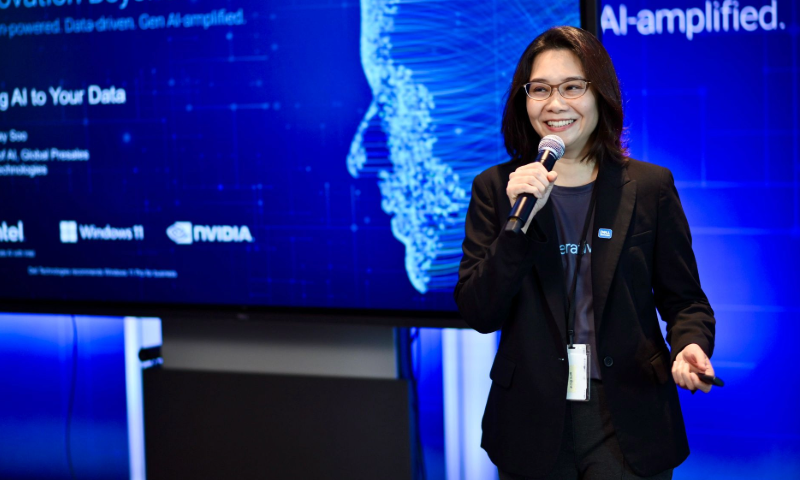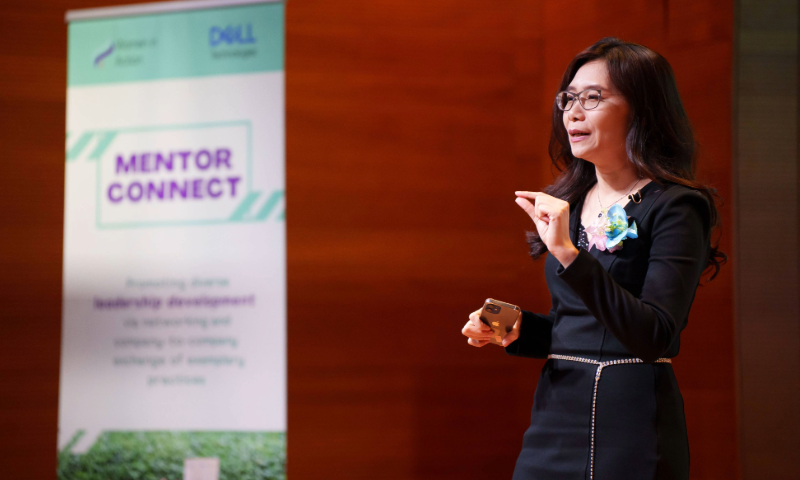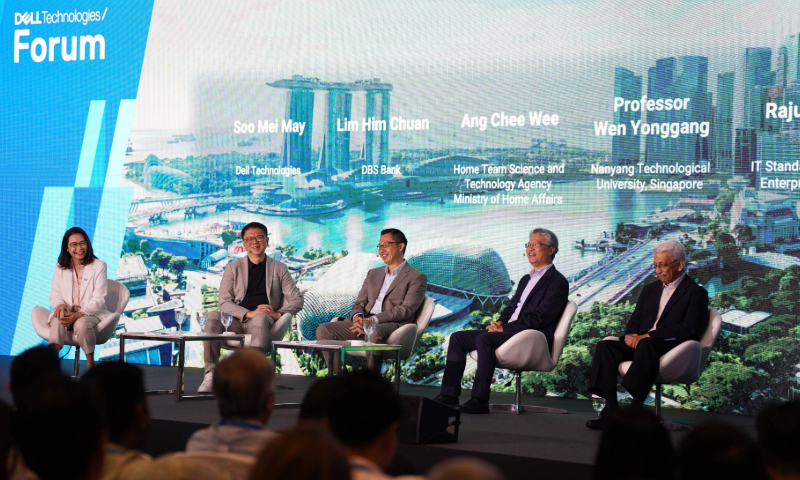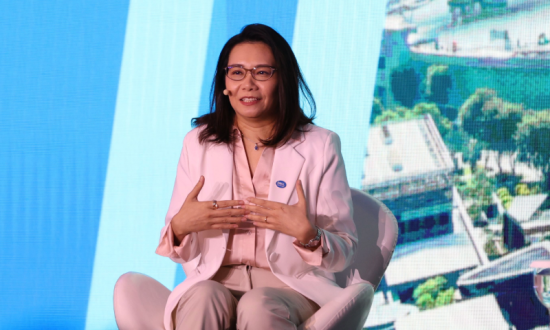In a world veiled in data, Mei May Soo’s passion for unravelling mysteries has not only shaped her career but also the future of data science. Under her visionary leadership, the Data Science and AI team in Singapore transcends traditional problem-solving by harnessing the predictive power of data, crafting a future informed by scientific rigor and human insights. For her, data is a tapestry interwoven with human stories. Her approach melds behavioral sciences with data interpretation, ensuring that every dataset narrates the human condition. With such deep knowledge in AI/ML she is able to explain complex data concepts to stakeholders in the simplest language at all levels of the organization.
Besides being passionate about data science, Mei May is also a big advocate in promoting diversity and inclusion in the workplace. Her dedication to fostering diversity echoes through the halls of Dell Technologies, where she is the chair for the Singapore Chapter of Dell Technologies’ Women in Action employee resource group (ERG). She is a key driver of the MentorConnect program hosted by WIA Singapore. Some of her recent accomplishments include one of the Top 10 CAIO by AI Magazine and one of the Top 50 women tech leaders in the inaugural Asia Women Tech Leaders Award 2024.
Recently, in an exclusive interview with Digital First Magazine, Mei May shared her professional trajectory, insights on diversity and inclusion, her favorite quote, future plans, words of wisdom, and much more. The following excerpts are taken from the interview.
Hi Mei. Can you walk us through your background and what you’re most passionate about in your work?
Coming from a background in economics and statistics, I have always enjoyed working with data. I have always been drawn to the challenge of turning complex data into actionable strategies to solve real-world problems and improve decision-making processes. The ability to uncover hidden patterns and insights from vast amounts of data is incredibly exciting.
Personally, what fuels my passion is the potential of data science and AI to positively impact society through advancements in healthcare, environmental sustainability, or enhancing everyday life.
What aspects of your current role bring you the most joy and fulfillment?
I love the fact that my current role at Dell places me at the forefront of technology. I find immense joy in exploring and harnessing the tremendous possibilities that data science and AI offer, often before it reaches the public eye.
This pioneering aspect of work allows me to innovate and solve complex problems, driving meaningful change and advancements in our field. The ability to transform raw data into actionable insights and see my work’s tangible impact on the organisation and society is really rewarding.
I do all of this in collaboration with a talented Dell team – one that continues to inspire and motivate me daily. Together, we continuously learn from each other in this field’s fast-paced and evolving nature, constantly pushing the boundaries of what’s possible.

What roles do data quality and governance play in AI initiatives, and how do you address data-related challenges?
By now, we all know that data is our key differentiator that gives us a competitive advantage. Not just data but good quality data. Data quality and governance are critical components of successful AI initiatives. High-quality data ensures that AI models are accurate, reliable, and effective in making predictions and decisions.
To address data-related challenges, we implement robust data governance frameworks that include clear policies and procedures for data collection, storage, processing, and usage. This involves ensuring data accuracy, completeness, consistency, and timeliness. We also prioritise data privacy and security to protect sensitive information and comply with regulatory requirements.
Regular data audits and validation processes are essential to promptly identify and rectify any issues. Additionally, we leverage advanced data cleaning and preprocessing techniques to enhance data quality before feeding it into AI models.
Collaboration across departments is crucial to maintaining data integrity, as it requires a collective effort to uphold standards and practices. By fostering a culture of data stewardship and continuous improvement, we can effectively manage data-related challenges and maximise the potential of our AI initiatives.
How do you stay ahead of emerging AI trends and innovations?
Be curious and have a thirst for knowledge. There is a lot of content out there to read, so I’d recommend curating a list of trusted sources to stay up to date on the latest trends and innovations in the AI world. I particularly enjoy reading updates from Andrew Ng and subscribing to the Deep Learning community.
Beyond reading, if there are relevant online courses that capture my attention and are relevant to my work, I sign up for them to learn more. The goal is not to obtain certificates for the sake of but rather to learn from everything that these specific short courses have to offer. Also, subscribing to key journals and publications, joining online forums, and attending industry conferences, are other ways to glean insights from leading experts.
However, nothing beats being hands-on and working on real-world use cases to get the best understanding of the technology, how to harness its potential and perhaps catch a glimpse of what could be next in its innovation. Often, when you identify some areas for improvement, that is most likely where the next evolution of the technology is going to come from.
What impact do you believe increased diversity and inclusion would have on innovation, creativity, and progress in your industry?
Diverse teams bring diverse perspectives, experiences, and ideas. These are qualities that I believe, are essential for creative problem-solving and innovation. When people from different backgrounds collaborate, they challenge assumptions and contribute unique insights, leading to more robust and innovative solutions.
When we embrace inclusion, everyone feels valued and empowered to contribute their best work. This creates a team environment where different ideas can thrive and come together in projects. A diverse team is more likely to spot bias in AI models that a homogenous group might miss. This allows us to address them and ensure fairness and equity in the solutions that we develop.
Ultimately, diversity and inclusion drive progress by making the industry more reflective of the society it serves. This alignment ensures that AI solutions are more equitable and effective across different demographics, which leads to broader acceptance and trust in AI.

What leadership qualities and skills do you believe are essential for driving growth and transformation, and how do you embody those qualities in your own leadership style?
Visionary thinking: A transformative leader is forward-thinking and someone who is always looking ahead to strategically pave new paths into unchartered territories. This is probably my most robust quality, and I enjoy inspiring my team with “what’s possible”.
Adaptability: The tech industry is constantly evolving, and being adaptable is critical to staying ahead. Have a mindset that enables us to refine goals, readjust objectives, and realign our paths. We ought to embrace change or even initiate change and view challenges as opportunities for innovation. This mindset helps us pivot quickly and effectively when needed.
Trust: Recognise that everyone has different strengths, but trust that they will get the job done. Give team members the autonomy and authority to make decisions while fostering a culture of accountability. When we are in exploration mode on a project, I am a firm believer in celebrating successes and I view honest mistakes as learning opportunities.
Be curious: Curiosity drives leaders to ask questions, seek knowledge, and explore new ideas. It is this fundamental trait that allows us to stay ahead of the curve, be aware of industry changes, and catch a glimpse of the future. I find myself learning way more intensely now than when I was in school because if we want to build a compelling vision for the team, we need to stay curious.
Who has been a personal role model or mentor to you throughout your career, and what qualities or characteristics have you admired or emulated?
Throughout my career, I have been fortunate to have a network of incredible individuals who have guided me in various ways. These mentors, each with their unique backgrounds and perspectives, have provided invaluable advice and support. I’ve learned technical skills from some, leadership and strategic insights from others, benefiting from their diverse expertise. This diverse mentorship has allowed me to broaden my horizons and accelerate growth in various aspects, and I am grateful for their willingness to share.
One quality I particularly admire and strive to emulate is generosity. Each mentor has shown me the importance of being generous with their time and knowledge, which has contributed significantly to my development. To be generous with knowledge attracts even more knowledge. It is when you share and teach that you will learn the most. Additionally, their empathy and supportiveness have taught me the value of fostering a collaborative and inclusive environment.
How do you keep your mind healthy and stay resilient? And how do you motivate your team?
Prioritise: Focus on the things that matter. Very quickly, you will learn that very few things do. Just keep your eyes on those few things. The next question on my favourite quote is a good follow-up.
Purpose: Always remember why you’re doing what you’re doing. If you don’t know why, you must find out. Having a sense of purpose keeps you going while preventing burnout.
Partnership: No man is an island. We keep each other sharp, challenge beliefs, push for improvements, encourage innovation, and maintain high standards together.
Play: The most creative ideas often come when we are playing. Keep it light – have lots of jokes and laughter. Being a leader doesn’t mean being the grim reaper in the room. Even in the most challenging times, a little laughter can go a long way to boost morale.
What is your favorite quote?
“Sometimes you need to let the eggs drop.” I made up this quote for my team and the people I mentor. Too many people get overwhelmed by too many things. These are often good people who simply have too much on their plates. Sometimes, we must let some things go because we cannot prevent every disaster and save everyone.
Often, when some things go awry, it is not simply because of one person’s mistake but usually a collective string of events or decisions that led to the trouble. So, if you’re the only person juggling and keeping the eggs in the air, you must ask whether those eggs genuinely matter.

Where do you see yourself in the next 5 years?
I envision myself continuing to lead and innovate in data science and AI, driving impactful projects that leverage AI and machine learning to solve complex problems. I aim to enhance my expertise further and stay at the forefront of technological advancements, ensuring that my work remains relevant and transformative.
I see myself taking on more strategic roles and actively expanding my influence by mentoring the next generation of tech leaders. My goal is to contribute to significant technological advancements that benefit society while achieving personal growth and professional fulfilment.
What message or advice would you give to young women or girls who are interested in pursuing a career in AI?
Be courageous – take risks and embrace challenges; they are opportunities for growth and learning. Seek mentors and role models who can guide and support you and force yourself to ask questions and seek help when needed. Mentors do not necessarily mean formal mentors; they can be anyone you admire and have expertise in the area you seek help from. These are most suitable when you are young and not exactly sure what you need—just one step at a time, one question at a time, one problem at a time.
Stay curious and committed to continuous learning. AI is constantly advancing, so engage with the community through conferences, workshops, and online forums to stay updated on the latest trends and developments. Actively explore and experiment with what you’ve learned after much passive reading. That helps you to learn effectively.
Lastly, while having technical prowess is necessary, having a passion for connecting technology with fellow human beings is essential. It is not just about coding or application development but improving processes, increasing efficiency, building human connections, and improving lives. After all, AI is about driving human progress.






